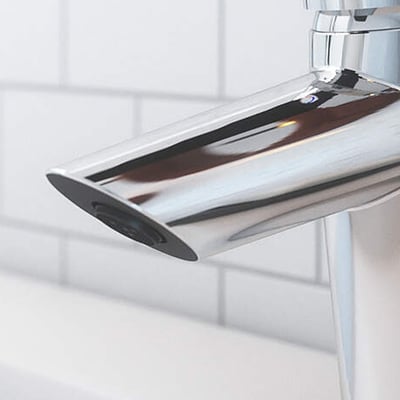A guide to preventing harmful microbes from invading your faucet, washbasin, shower and your entire bathroom area.
With cold and flu season in full swing and infectious diseases in the air, bathroom hygiene is an essential step in keeping our families safe and healthy.
/Denmark/Blog/Press%20releases/Oras%20SMART%202020_family.jpg?width=860&name=Oras%20SMART%202020_family.jpg) Bathroom hygiene is an essential step in keeping our families safe and healthy.
Bathroom hygiene is an essential step in keeping our families safe and healthy.
Though the bathroom can be the least favourite room to maintain, cleaning it doesn’t have to be a difficult or unpleasant a job. In fact, a few simple tips in your regular cleaning schedule can keep your bathroom environment healthy and safe – minimising infections and illnesses.
Bathroom Cleaning Checklist
- Door handles and light switch
- Towels
- Bathmat
- Shower curtain
- Toilet and bidet
- Showerhead
- Faucet and washbasin
We’ve compiled an easy-to-follow checklist with simple changes you can start today.
Door handles and light switch
Throughout the day, your bathroom door handle and light switch are touched by everyone in your household countless times. A recent survey found that roughly 10% of respondents never clean their door handles. We suggest disinfecting the interior and exterior door handles after every use. This is a great habit to get in to, especially at this time of year. The same applies to your bathroom light switch.
Towels
Moisture-holding towels can contain yeast, mould and, in some cases, harmful bacteria. Proper towel care through more frequent towel replacement and laundering at the correct temperature can help decrease the spread of illness in your household.
During the colder months of the year, wash your body towels after every third or fourth use and after every use if someone is sick or has a chronic skin condition. Wash your face and hand towels after every use if possible, and as an extra precaution, make sure everyone in your household has their own towels.
A study in hospital protocols found that to keep towels bacteria-free and fresh, launder towels at a minimum temperature of 60° Celsius. Replace bathroom towels every two years or sooner if they start to fray or smell damp even after a washing.
To keep towels bacteria-free and fresh, launder towels at a minimum temperature of 60° Celsius.
Bathmats
The same care needs to go into your bathmats as they also retain moisture and are in constant contact with your bathroom floor. If you have a full house, wash your bathmat once a week and replace it every six months. If your household is only you or one other person, bathmats can go roughly two to three weeks between washes. They can be washed alongside bathroom towels but remember that rubber-backed bathmats must be air-dried and not put in the dryer.
Shower curtain
Shower curtains also need regular monthly cleaning to prevent soap residue and mold build-up. There are many different shower curtain materials, so always check directions before washing. Fabric shower curtains can usually be washed with towels while plastic shower curtains need a more gentle, lower temperature cycle and no dryer.
Toilet and bidet
Cold and flu viruses can live on surfaces for up to nine days, depending on temperature and humidity. This makes the toilet, bidet and the area around them, critical areas in need of regular deep cleaning.
Clean the inside of the bowls with disinfecting cleaning agents – don’t forget to wear rubber gloves and remember to let everything sit for about five minutes after cleaning before you flush. Toilet scrubbing brushes should typically be replaced every six months if made out of plastic.
To clean the toilet and bidet handles, use a disinfectant spray and let sit for at least five minutes before wiping down.
Do this whole cleaning process once a week or every other week and increase to two and three times a week during cold and flu season.
Start a new habit
To stop the spread of airborne germs from inside your toilet bowl, close the lid when flushing
The bathroom faucet: a key contributor to better health
The most important part of our bathroom that needs to be cleaned thoroughly and frequently is the faucet. We touch the faucet handle with dirty hands meaning that it can carry up to 600 times more microorganisms than a toilet handle, for example.
Cleaning the inside and the outside of your faucet will keep your hands clean and your faucet germ-free. Once a month, clean the inside of your faucet by unscrewing the head from the faucet (known as the aerator) and cleaning out any build-up of grime.

The aerator can be found at the tip of the spout and should be cleaned monthly.
Once a week, clean the outside of your faucet and washbasin by wiping down all edges and curves, and any hard-to-reach spots.
How to clean your aerator
- Step 1: Turn the faucet off
- Step 2: Remove the aerator with a small tool or with your fingers. Please note that some models require a special tool for removing the aerator.
- Step 3: Brush it with a small brush such as an old toothbrush
- Step 4: Put the aerator back in place
Better hygiene with touchless faucets
Another way to reduce your risk of spreading germs in your home is by using a touchless faucet in your bathroom. The switch to a touchless faucet can effectively enhance surface hygiene compared to a manually operated faucet — simply because contact with surfaces is reduced to a minimum.

A touchless faucet can significantly improve hygiene at home.
And, if you don’t have to touch the faucet, your weekly cleaning just got a whole lot faster and easier. To keep your faucet in great condition, just remember to put any disinfectant on your cleaning cloth, rather than the faucet itself, and finish with a dry clean cloth. Read our instruction on how to clean you faucet correctly here.
We hope these simple tips help keep your bathroom clean and safe – ready for cold and flu season.

-block-desktop-860x480.jpg?width=940&name=40210_Hansa_Vantis_Style_Basin01_Hansa_Vari_oh_IR.tif(1)-block-desktop-860x480.jpg)

-block-desktop-860x480%20(1).jpg?width=940&name=Oras_Romantic_V3.jpg(1)-block-desktop-860x480%20(1).jpg)

/Denmark/Blog/Press%20releases/Oras%20SMART%202020_family.jpg?width=860&name=Oras%20SMART%202020_family.jpg)


